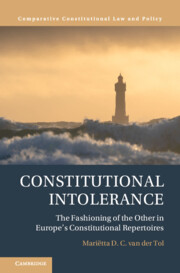Book contents
- Constitutional Intolerance
- Comparative Constitutional Law and Policy
- Constitutional Intolerance
- Copyright page
- Dedication
- Contents
- Acknowledgements
- 1 What Is Constitutional Intolerance?
- 2 Governing Religious Difference
- 3 Toleration, Time, and the Other
- 4 National Identity, Publicness, and Public Space
- 5 Dynamic Interpretation of Constitutional Concepts
- 6 Ad libitum Use of Constitutional Concepts
- 7 Constitutional Identity as a Political Instrument
- 8 Pseudo-constitutional Repertoires
- 9 Conclusion
- Bibliography
- Index
9 - Conclusion
Constitutional Intolerance in Context
Published online by Cambridge University Press: 09 January 2025
- Constitutional Intolerance
- Comparative Constitutional Law and Policy
- Constitutional Intolerance
- Copyright page
- Dedication
- Contents
- Acknowledgements
- 1 What Is Constitutional Intolerance?
- 2 Governing Religious Difference
- 3 Toleration, Time, and the Other
- 4 National Identity, Publicness, and Public Space
- 5 Dynamic Interpretation of Constitutional Concepts
- 6 Ad libitum Use of Constitutional Concepts
- 7 Constitutional Identity as a Political Instrument
- 8 Pseudo-constitutional Repertoires
- 9 Conclusion
- Bibliography
- Index
Summary
This concluding chapter reflects on the phenomenon of constitutional intolerance, its many faces, its entanglement in histories of toleration, and its implications for discourses on constitutionalism, illiberalism, and secularisation. It argues that the default lines have shifted from secularisation to fundamental questions about the future of constitutional democracy in Europe, considering the fundamental aspects of constitutional intolerance: the articulation of otherness vis-à-vis the political community and the sanctioning of this othering in public space. The conclusion also considers the rise of “cynical democracy” in the instrumental use of constitutional repertoires to further partisan interests, as well as the right wing tendency towards the overrepresentation of formal-procedural legalism, an attachment of legitimacy to legality, and a weakening of the capacity for normative reflection in the highest courts.
Keywords
- Type
- Chapter
- Information
- Constitutional IntoleranceThe Fashioning of the Other in Europe's Constitutional Repertoires, pp. 143 - 156Publisher: Cambridge University PressPrint publication year: 2025

